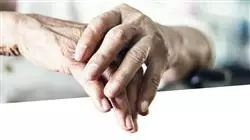University certificate
The world's largest faculty of medicine”
Introduction to the Program
Throughout 1,620 educational hours, you will get the best preparation from the practical and theoretical point of view regarding the best innovations in the field of Psychogeriatrics”

Since the beginning of the 21st century, research in Psychogeriatricshas increased significantly, allowing the emergence of new diagnostic tools and the development of more advanced clinical prevention strategies. Therefore, nowadays, there are much more modern protocols to maintain a healthy state of life in the elderly from a cognitive, behavioral and psychological point of view. However, specialists in this branch of healthcare do not have enough programs to enable them to integrate these advances into their daily work and are not fully familiar with the data collection tools that are so valuable for medical decision making.
In this context, TECH has developed a high-level academic program to train professionals in this discipline. Therefore, the Hybrid professional master’s degree in Psychogeriatrics consists of two distinct educational phases. In the first phase, the specialist will receive the most complete theoretical contents on this subject, from a 100% online and interactive learning platform. In addition to the conventional materials, the specialist will be able to assimilate knowledge through multimedia resources such as infographics and interactive summaries. Throughout this initial period of study, each doctor will have total freedom to self-manage their educational process in an individualized way and over the course of 1,500 teaching hours.
In order to continue the academic preparation, the program offers a clinical practice stage, for a period of 3 weeks, in a prestigious health center. During this process, doctors will have the opportunity to apply all the new skills acquired on real patients, under the close supervision of highly qualified experts. In addition, they will have an assistant tutor who will provide them with additional tasks to expand their competencies. Thanks to this study method, professionals will be able to place themselves easily at the forefront of this health area.
Get up to date with TECH, the largest digital university in the world”
This Hybrid professional master’s degree in Psychogeriatrics contains the most complete and up-to-date scientific program on the market. The most important features include:
- More than 100 clinical cases presented by experts in the clinical practice of Psychogeriatrics
- The graphic, schematic, and practical contents with which they are created, provide scientific and practical information on the disciplines that are essential for professional practice
- Comprehensive systematized action plans for the main pathologies in Psychogeriatrics
- Presentation of practical workshops on procedures diagnosis, and treatment techniques
- An algorithm-based interactive learning system for decision-making in the clinical situations presented throughout the course
- Practical clinical guides on approaching different pathologies
- All this will be complemented by theoretical lessons, questions to the expert, debate forums on controversial topics, and individual reflection assignments
- Content that is accessible from any fixed or portable device with an Internet connection
- Furthermore, you will be able to carry out a clinical internship in one of the best centers on the international scene
For 3 weeks, the clinical internship that concludes this program will open the doors of a hospital institution where you will apply modern neurostimulation treatments for the elderly with dementia and other psycho-behavioral disorders”
In this proposed Professional Master's Degree, of a professionalizing nature and hybrid learning modality, the program is aimed at updating professionals who require a high level of qualification. The contents are based on the latest scientific evidence, and oriented in an educational way to integrate theoretical knowledge into practice, and the theoretical-practical elements will facilitate knowledge updates and decision-making in patient management.
The multimedia content developed with the latest educational technology will provide the health professional with situated and contextual learning, i.e., a simulated environment that will provide an immersive education program to learn in real situations. This program is designed around Problem-Based Learning, whereby the physician must try to solve the different professional practice situations that arise during the course. For this purpose, students will be assisted by an innovative interactive video system created by renowned and experienced experts.
You will delve into the most complete and current ways to assess the psychosocial state of the geriatric patient thanks to this very complete program"

You will apply, during the practical phase of this program, combined therapeutic methods according to the personal characteristics of each elderly patient"
Why study at TECH?
TECH is the world’s largest online university. With an impressive catalog of more than 14,000 university programs available in 11 languages, it is positioned as a leader in employability, with a 99% job placement rate. In addition, it relies on an enormous faculty of more than 6,000 professors of the highest international renown.

Study at the world's largest online university and guarantee your professional success. The future starts at TECH”
The world’s best online university according to FORBES
The prestigious Forbes magazine, specialized in business and finance, has highlighted TECH as “the world's best online university” This is what they have recently stated in an article in their digital edition in which they echo the success story of this institution, “thanks to the academic offer it provides, the selection of its teaching staff, and an innovative learning method aimed at educating the professionals of the future”
A revolutionary study method, a cutting-edge faculty and a practical focus: the key to TECH's success.
The most complete study plans on the university scene
TECH offers the most complete study plans on the university scene, with syllabuses that cover fundamental concepts and, at the same time, the main scientific advances in their specific scientific areas. In addition, these programs are continuously being updated to guarantee students the academic vanguard and the most in-demand professional skills. In this way, the university's qualifications provide its graduates with a significant advantage to propel their careers to success.
TECH offers the most comprehensive and intensive study plans on the current university scene.
A world-class teaching staff
TECH's teaching staff is made up of more than 6,000 professors with the highest international recognition. Professors, researchers and top executives of multinational companies, including Isaiah Covington, performance coach of the Boston Celtics; Magda Romanska, principal investigator at Harvard MetaLAB; Ignacio Wistumba, chairman of the department of translational molecular pathology at MD Anderson Cancer Center; and D.W. Pine, creative director of TIME magazine, among others.
Internationally renowned experts, specialized in different branches of Health, Technology, Communication and Business, form part of the TECH faculty.
A unique learning method
TECH is the first university to use Relearning in all its programs. It is the best online learning methodology, accredited with international teaching quality certifications, provided by prestigious educational agencies. In addition, this disruptive educational model is complemented with the “Case Method”, thereby setting up a unique online teaching strategy. Innovative teaching resources are also implemented, including detailed videos, infographics and interactive summaries.
TECH combines Relearning and the Case Method in all its university programs to guarantee excellent theoretical and practical learning, studying whenever and wherever you want.
The world's largest online university
TECH is the world’s largest online university. We are the largest educational institution, with the best and widest online educational catalog, one hundred percent online and covering the vast majority of areas of knowledge. We offer a large selection of our own degrees and accredited online undergraduate and postgraduate degrees. In total, more than 14,000 university degrees, in eleven different languages, make us the largest educational largest in the world.
TECH has the world's most extensive catalog of academic and official programs, available in more than 11 languages.
Google Premier Partner
The American technology giant has awarded TECH the Google Google Premier Partner badge. This award, which is only available to 3% of the world's companies, highlights the efficient, flexible and tailored experience that this university provides to students. The recognition as a Google Premier Partner not only accredits the maximum rigor, performance and investment in TECH's digital infrastructures, but also places this university as one of the world's leading technology companies.
Google has positioned TECH in the top 3% of the world's most important technology companies by awarding it its Google Premier Partner badge.
The official online university of the NBA
TECH is the official online university of the NBA. Thanks to our agreement with the biggest league in basketball, we offer our students exclusive university programs, as well as a wide variety of educational resources focused on the business of the league and other areas of the sports industry. Each program is made up of a uniquely designed syllabus and features exceptional guest hosts: professionals with a distinguished sports background who will offer their expertise on the most relevant topics.
TECH has been selected by the NBA, the world's top basketball league, as its official online university.
The top-rated university by its students
Students have positioned TECH as the world's top-rated university on the main review websites, with a highest rating of 4.9 out of 5, obtained from more than 1,000 reviews. These results consolidate TECH as the benchmark university institution at an international level, reflecting the excellence and positive impact of its educational model.” reflecting the excellence and positive impact of its educational model.”
TECH is the world’s top-rated university by its students.
Leaders in employability
TECH has managed to become the leading university in employability. 99% of its students obtain jobs in the academic field they have studied, within one year of completing any of the university's programs. A similar number achieve immediate career enhancement. All this thanks to a study methodology that bases its effectiveness on the acquisition of practical skills, which are absolutely necessary for professional development.
99% of TECH graduates find a job within a year of completing their studies.
Hybrid Professional Master’s Degree in Psychogeriatrics
Immerse yourself in the exciting world of Psychogeriatrics and expand your knowledge in the care and treatment of mental disorders in the elderly with this Hybrid Professional Master's Degree in Psychogeriatrics from TECH Global University. This program gives you the opportunity to become an expert in the field of mental health of older adults. Currently, the aging of the population and the increase in life expectancy have generated a growing demand for professionals specialized in Psychogeriatrics. Understanding and attending to the emotional and cognitive needs of the elderly is essential to provide comprehensive care and improve their quality of life. The Hybrid Professional Master's Degree in Psychogeriatrics will provide you with a comprehensive vision of the psychological disorders that affect older adults, such as dementia, depression, anxiety and behavioral disorders. You will learn to assess, diagnose and design treatment plans tailored to the individual needs of each patient. In addition, you will have the opportunity to acquire practical skills through internships in geriatric and research centers in the field of Psychogeriatrics. These experiences will allow you to apply your knowledge in a real environment and develop your clinical skills.
Combine the best of both modalities
Our Hybrid Professional Master's Degree combines the convenience of online education with practical interaction in on-site environments. Through our virtual platform, you will have access to state-of-the-art materials and can study according to your own schedule. In addition, you will have face-to-face sessions in our state-of-the-art facilities, where you can participate in hands-on activities and make connections with experts in the field and other students. At TECH Global University, we are proud to have a highly qualified teaching staff, made up of professionals with extensive experience in Psychogeriatrics. They will guide you in your learning process and provide you with the necessary tools to understand in depth the most common mental disorders in the elderly and apply effective therapeutic strategies.







